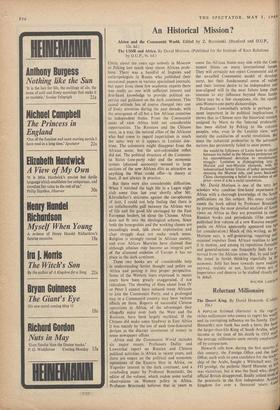An Historical Mission ?
UNTIL about ten years ago nobody in Moscow or Peking lost much sleep about African prob- lems. There was a handful of linguists and anthropologists in Russia who published their occasional papers in various specialised journals, but apart from these few academic experts there was really no one with sufficient interest and first-hand knowledge to provide political ex- pertise and guidance on the dark continent. This casual attitude has of course changed into one of lively attention during the past decade, with the emergence of all but a few African countries as independent States. From the Communist point of view Africa held out considerable opportunities. The Russians and the Chinese were, in a way, the natural allies of the Africans who had come to regard imperialism in much the same way as it appears in Leninist doc- trine. The colonisers might disappear from the African scene, but the anti-colonialist reflex did not. The political structure of the Commun- ist States (one-party rule) and the economic system (planned economy) seemed to large sections of the new African elite as attractive as anything the West could offer—in theory at least, if not always in practice.
But there were also considerable difficulties. When I watched the high life in a Lagos night club some time last year shortly after Mr. Khrushchev's strictures against the cacophonies of jazz, I could not help feeling that there is an unfathomable gulf between the African way of life and the good life envisaged by the East European leaders, let alone the Chinese. Africa does not fit into the ideological scheme. Since both the bourgeoisie and the working classes are exceedingly weak, talk about exploitation and class struggle does not make much sense. Religion is strongly rooted in African society, and even African Marxists have claimed that although atheism may become an integral part of the alienated societies of Europe it has no place in the dark continent.
These two books are of considerable help in understanding Soviet thought and policy on Africa and putting it into proper perspective. Some of the Western fears expressed in recent years have been greatly exaggerated, if not ridiculous. The showing of films about Ivan IV or Peter I cannot have induced many Africans to join the Communist Party, and a prolonged stay in a Communist country may have various effects on them. Reports of successful Chinese operations in Africa, of the advantages they allegedly enjoy over both the West and the Russians, have been largely mythical. If the Chinese did make some headway in East Africa it was mainly by the use of such time-honoured devices as the discreet investment of money in some newspaper offices.
Africa and the Communist World includes six major essays. Professors Dallin and Lowenthal report on Russian and Chinese political activities in Africa in recent years, and there are essays on the political and economic operations of the Eastern bloc in Africa, on Yugoslav interest in the dark continent, and a concluding paper by Professor Brzezinski, the editor of the volume, which makes some useful observations on Western policy in Africa. Professor Brzezinski believes that in years to
ootne the African States may side with the Cony munist States on many international issue.
They will certainly not reject Communist aid Of the so-called Communist model of develop•
ment, but their fundamental sense of value and their intense desire to be independent and non-aligned will in the near future keep theta immune to any influence beyond these limits. There may be a few exceptions, viz. the openly anti-Western one-party dictatorships.
Professor Lowenthal's article is perhaps the most important in its political implications. it shows that in Chinese eyes the historical mission assigned by Marx to the 'internal proletariat' has been shifted by Peking to the colonial peoples, who, even in the Leninist view, were merely the auxiliaries of world revolution. But since the industrial proletariat in the advanced nations has persistently failed to seize power,
the would-be followers of Lenin have to choose between his belief in the Marxian proletariat and his unconditional devotion to revolutionall struggle: Leninism is disintegrating into art Marxist and non-Marxist elements, with the industrialised Soviet Union of today increasingll stressing the Marxist side, and poor, backward China championing a belief in revolution at and price—even if it be a racial revolution.
Mr. David Morison is one of the very fog scholars who combine first-hand experience et Africa with a thorough knowledge of the Soviet publications on this subject. His essay comPle" merits the book edited by Professor Brzezinski by presenting the most detailed analysis of Soviet views on Africa as they are presented in recent Russian books and periodicals. (The recently published first volume of a new Russian encycIT pmdia on Africa apparently appeared too late
for consideration.) Much of this writing. as Mt Morison says, is self-generating, requiring only minimal impulses from African realities to keep
it in motion, and among its repetitious formulas and generalisations one frequently feels far re' moved from the African scene. But, by and larger the trend in Soviet thinking especially in the economic field has been towards more malts° anyway, realistic or not, Soviet views arc ut importance and deserve to be studied closely 04 in detail.
.1
WALTER LAQUi-.10














































 Previous page
Previous page